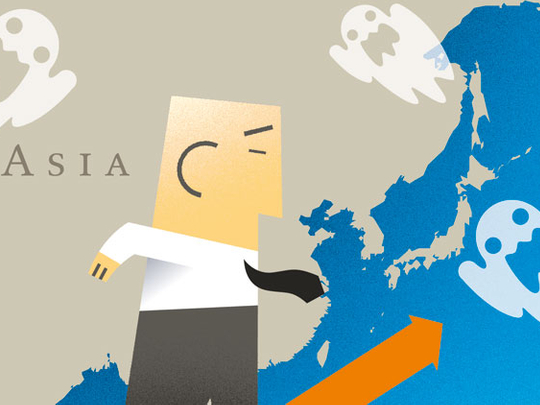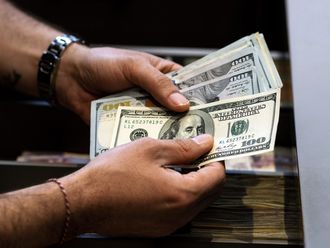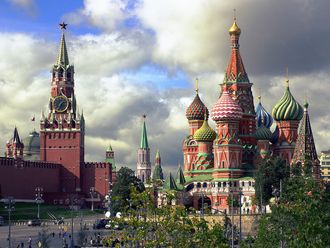
Asia weathered the "Lehman shock" of 2008 with impressive calm. Now it is being tested by a jolt from Goldman Sachs Group Incorporated.
Markets recoiled at the Securities and Exchange Commission's April 16 fraud suit against Goldman. On April 19, stocks fell the most in two months on concern that financial companies face greater scrutiny. By the following day, all was forgotten in Asia.
Perhaps it dawned on traders that the SEC action is good for the region. Its resilience amid the global crisis and progress in decoupling from the West haven't changed. Looking forward, anything that brings real reform to the biggest economy is stellar news for Asia and the rest of the world.
When you consider the tests of the last 19 months, such as a global credit crunch, Lehman Brothers Holdings Incorporated's bankruptcy and Greece's deficit woes, the odds of Asia escaping any fallout looked grim. Especially with Japan beset by deflation and China reliant on US consumers living beyond their means.
Asia has managed to confound the sceptics, and that isn't about to change. Even the big challenge of central banks falling behind the inflation curve is an enviable one.
In Washington and Frankfurt, the focus is on monetary policy's limits. Near-zero interest rates aren't boosting growth as fast as they were supposed to. The troubles facing officials in Hanoi and Seoul are preferable.
Bank stocks
It's worth noting that bank shares in countries such as China and India have outperformed global rivals by about 30 percentage points since Lehman blew up in September 2008.
That dynamic should continue and even gain steam.
A couple of years ago, many global investors considered Asia's regulatory environment too strict and inhibiting of financial innovation.
Nowadays, that conservatism is a virtue. The health of Asian balance sheets and the reasonable pace of loan growth relative to the US and Europe explain why investors are heading this way.
Asia is hardly devoid of problems. It has done well on a macro-economic level during this crisis, yet it's also been hit hard below the surface.
"We have 70 million-plus people still mired in poverty as a result of the financial crisis," Rajat Nag, managing director of the Asian Development Bank, said on April 19. Nag, for one, is "very pleased" with the SEC's move to go after Goldman.
Tightrope walking
Central banks have quite a bit of tightrope walking to do. They need to be mindful of struggling households.
They also must mop up liquidity to avoid excessive asset prices.
Indonesia is a case in point: Even the central bank agrees Jakarta's stock market is a bubble.
Japan's woes are growing, too. Asia's biggest economy was hit hard by the financial crisis. Yet Japan's experience jibes with the nature of the turmoil.
This crisis didn't go to the periphery of the global economy, but to its core.
It's the Group of Seven economies that are reeling, not developing ones.
The Lehman shock gave way to the "Toyota shock," which really was a two-part process.
The first was the plunge in Toyota Motor Corporation sales in late 2008 and into 2009. The second was the celebrated brand's car-safety debacle.
If there is a silver lining here, it's that Asia is proving adept at living without Japan.
Strong growth from China and India don't fill the void left by a hobbled US, yet it's helping.
And so, the Asia decoupling argument gets to live on until challenged anew by the next global crisis.
On that front, Goldman's plight is actually good news. Surprise on the part of Asian investors at the lack of financial reform in Washington gave way to disillusionment.
Signs that US regulators are finally trying to exact some justice from Wall Street could change everything
Sustainability
That the effort involves Goldman Sachs means it's a bit loaded.
Schadenfreude abounded last year when a Rolling Stone magazine writer labelled Goldman a "great vampire squid wrapped around the face of humanity".
It's an image that captured how many in Asia viewed Wall Street following the region's 1997 crisis.
American funds came in, wrapped their tentacles around assets and bought them on the cheap.
A functioning US financial industry is one thing; a sustainable one is equally important.
America has been sending financial contagion Asia's way for the past 18 months, just as Asia sent it to the West a decade earlier. The key for the global economy is to avoid a repeat of either scenario.
Until now, there has been scant evidence that the US was righting its anything-goes model.
The SEC's Goldman suit is just the tip of the iceberg.
As such actions spread and financial executives are made accountable, Asia can look forward to the day when US markets are sounder destinations for their trillions of dollars of savings.
Asia is working to wean itself off the US. In the meantime, what's good for the world's dominant financial power is good for Asia.
Unlike the Lehman one, the Goldman shock may be just the thing for this region's prosperity.












